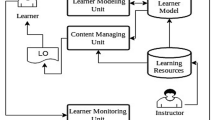Abstract
Nowadays, personalization and adaptivity becomes more and more important in most systems. When it comes to education and learning, personalization can provide learners with better learning experiences by considering their needs and characteristics when presenting them with learning materials within courses in learning management systems. One way to provide students with more personal learning materials is to deliver personalized content from the web. However, due to information overload, finding relevant and personalized materials from the web remains a challenging task. This paper presents an adaptive recommender system called WEBLORS that aims at helping learners to overcome the information overload by providing them with additional personalized learning materials from the web to increase their learning and performance. This paper also presents the evaluation of WEBLORS based on its recommender system acceptance using data from 36 participants. The evaluation showed that overall, participants had a positive experience interacting with WEBLORS. They trusted the recommendations and found them helpful to improve learning and performance, and they agreed that they would like to use the system again.
Access this chapter
Tax calculation will be finalised at checkout
Purchases are for personal use only
Similar content being viewed by others
References
Imran, H., Belghis-Zadeh, M., Chang, T.-W., Kinshuk, Graf, S.: PLORS: a personalized learning object recommender system. Vietnam J. Comput. Sci. 3(1), 3–13 (2016)
Dwivedi, P., Bharadwaj, K.: e-Learning recommender system for a group of learners based on the unified learner profile approach. Expert Syst. 32(2), 264–276 (2015)
Sabourin, J., Kosturko, L., McQuiggan, S.: Where to next? A comparison of recommendation strategies for navigating a learning object repository. In: Ricci, F., Bontcheva, K., Conlan, O., Lawless, S. (eds.) UMAP 2015. LNCS, vol. 9146, pp. 208–215. Springer, Cham (2015). https://doi.org/10.1007/978-3-319-20267-9_17
Al Abri, M., Dabbagh, N.: Open educational resources: a literature review. J. Mason Grad. Res. 6(1), 83–104 (2018)
Akhtarzada, A., Calude, C.S., Hosking, J.: A multi-criteria metric algorithm for recommender systems. Fundamenta Informaticae 110, 1–11 (2011)
Manouselis, N.: Recommender Systems for Learning. Springer, New York (2013)
Dahdouh, K., Oughdir, L., Dakkak, A., Ibriz, A.: Building an e-learning recommender system using association rules techniques and R environment. Int. J. Inf. Sci. Technol. 3(2), 11–18 (2019)
Bourkoukou, O., Bachari, E.E.: Toward a hybrid recommender system for e-learning personnalization based on data mining techniques. Int. J. Inform. Vis. 2(4), 271–278 (2018)
Zapata, A., Menéndez, V.H., Prieto, M.E., Romero, C.: A framework for recommendation in learning object repositories: an example of application in civil engineering. Adv. Eng. Softw. 56, 1–14 (2013)
Atkinson, J., Gonzalez, A., Munoz, M., Astudillo, H.: Web metadata extraction and semantic indexing for learning objects extraction. Appl. Intell. 41(2), 649–664 (2014)
Rahman, M.M., Abdullah, N.A.: A personalized group-based recommendation approach for web search in e-learning. IEEE Access 6, 34166–34178 (2018)
Rose, S., Engel, D., Cramer, N., Cowley, W.: Automatic keyword extraction from individual documents. In: Text Mining, pp. 1–20. Wiley (2010)
Felder, R., Silverman, L.: Learning and teaching styles in engineering education. Eng. Educ. 78(7), 674–681 (1988)
Felder, R.M., Soloman, B.A.: Index of learning style questionnaire. https://www.webtools.ncsu.edu/learningstyles/. Accessed 20 July 2019
Felder, R., Spurlin, J.: Applications, reliability and validity of the index of learning styles. Int. J. Eng. Educ. 21, 103–112 (2005)
El-Bishouty, M.M., Saito, K., Chang, T.W., Kinshuk, Graf, S.: An interactive course analyzer for improving learning styles support level. In: Holzinger, A., Pasi, G. (eds.) HCI-KDD 2013. LNCS, vol. 7947, pp. 136–147. Springer, Cham (2013). https://doi.org/10.1007/978-3-642-39146-0_13
Bäck, T.: Evolutionary Algorithms in Theory and Practice: Evolution Strategies, Evolutionary Programming, Genetic Algorithms. Oxford University Press, New York (1996)
Dougiamas, M.: Moodle. http://moodle.org/. Accessed 20 July 2019
Brooke, J.: SUS: a quick and dirty usability scale. In: Jordan, P.W., et al. (eds.) Usability Evaluation in Industry, pp. 189–194. Taylor and Francis, London (1996)
Lewis, J.R., Sauro, J.: The factor structure of the system usability scale. In: Kurosu, M. (ed.) HCD 2009. LNCS, vol. 5619, pp. 94–103. Springer, Heidelberg (2009). https://doi.org/10.1007/978-3-642-02806-9_12
Acknowledgment
The authors acknowledge the support of Athabasca University, Alberta Innovates – Technology Futures (AITF), Ministry of Advanced Education of Canada, the National Science and Engineering Research Council of Canada (NSERC) [funding reference number: 402053-2012-RGPIN], and Mitacs.
Author information
Authors and Affiliations
Corresponding author
Editor information
Editors and Affiliations
Rights and permissions
Copyright information
© 2019 Springer Nature Switzerland AG
About this paper
Cite this paper
Belghis-Zadeh, M., Imran, H., Chang, M., Graf, S. (2019). WEBLORS – A Personalized Web-Based Recommender System. In: Herzog, M., Kubincová, Z., Han, P., Temperini, M. (eds) Advances in Web-Based Learning – ICWL 2019. ICWL 2019. Lecture Notes in Computer Science(), vol 11841. Springer, Cham. https://doi.org/10.1007/978-3-030-35758-0_24
Download citation
DOI: https://doi.org/10.1007/978-3-030-35758-0_24
Published:
Publisher Name: Springer, Cham
Print ISBN: 978-3-030-35757-3
Online ISBN: 978-3-030-35758-0
eBook Packages: Computer ScienceComputer Science (R0)




